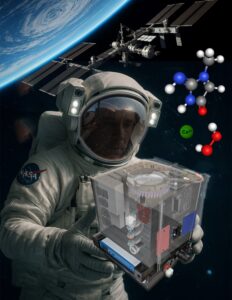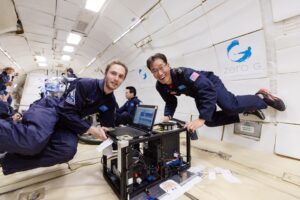
Astronauts face potential risks including musculoskeletal degradation, cancer, and kidney issues from prolonged exposure to radiation and microgravity. A recent publication from the Kim Lab, led by Dr. Jungkyu ‘Jay’ Kim, in ACS Sensors showcases the Microfabricated Onsite Analyzer for Biomarkers (MOAB), a portable, automated health monitoring device designed specifically for astronauts on long-duration space missions. The paper was co-authored with students Zachary Estlack and Andrew Pack, along with partners from the Space Science Lab at UC Berkeley.
“The MOAB can simultaneously detect multiple critical health biomarkers including calcium, creatinine, and hydrogen peroxide,” said Kim. “These indicate bone health, kidney function, and radiation exposure stress in real time. Most importantly, we’ve successfully tested the MOAB under actual microgravity conditions during Zero-G flight, proving it works reliably in space environments.”
Current space health monitoring focuses on basic vitals. The MOAB’s programmable microfluidic array (PMA) technology instead allows it to perform multiple different health tests using the same compact device, reducing an entire medical laboratory to the size of a small box. This allows the system to detect specific biomarkers that reveal early signs of bone loss, kidney problems, and radiation damage. The device is also fully automated and reusable, requiring minimal astronaut training or intervention, critical advantages when every minute of astronaut time is precious.

“We achieved a major milestone by demonstrating that complex, multiplexed biomarker analysis can be performed automatically in microgravity,” said Kim. “This is the first time such sophisticated health monitoring has been proven to work in space conditions. The ability to monitor health in real-time during a multi-year mission could be revolutionary for space medicine, allowing mission control and crew medical officers to detect health issues early and intervene before they become critical problems.”
The team is now working toward full flight readiness by expanding the range of biomarkers MOAB can detect, adding assays for cancer risk factors, muscle health, and additional radiation exposure markers. Future developments include integrating automated sample preparation systems and potentially adding ELISA-based testing capabilities, which would further expand the device’s diagnostic capabilities.
“We’ve essentially solved one of the key challenges to keeping astronauts healthy during the 8+ month journey to Mars and extended stays on other planets,” said Kim.
The same platform is also being adapted for astrobiology research. With a few tweaks to the system, the team is configuring the MOAB to search for biosignatures and identify various organic compounds that could indicate past or present life beyond Earth.
“The same technology protecting astronaut health could also help answer one of humanity’s most profound questions,” said Kim, “are we alone in the universe?”
While the MOAB is currently focused on space medicine and astrobiology, the technology is not limited to use there. The same portable, automated detection capabilities could revolutionize point-of-care medical testing here on Earth. Particularly in remote locations, disaster zones, or other resource-limited settings where a traditional laboratory isn’t available, the MOAB could fill the gap in medical diagnostics.
You can visit the Kim Lab Website for more information, or find the full article in ACS Sensors.